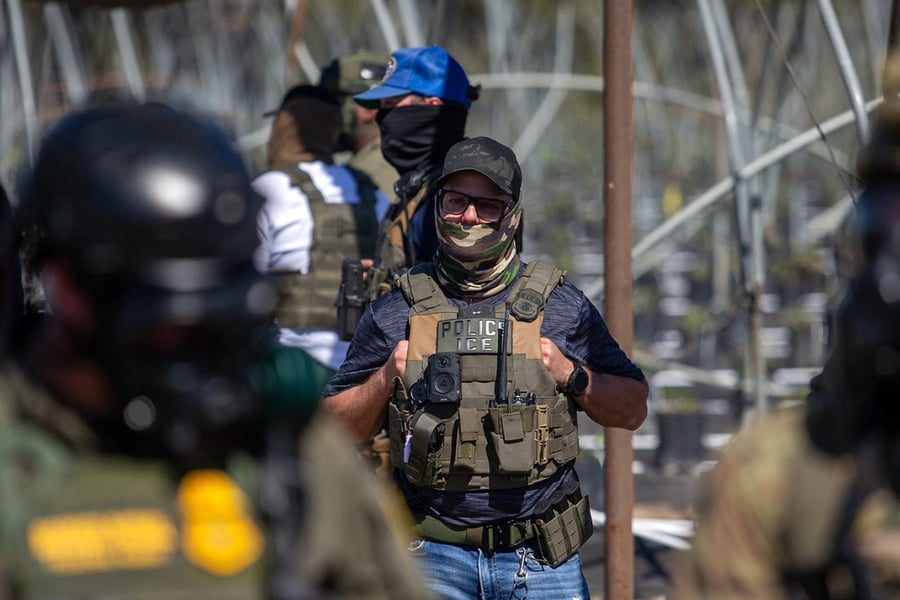After nearly two decades and nearly a trillion dollars invested to reduce veteran suicide, thousands of military veterans are once again living in fear. This time, it isn’t from the crushing weight of post-traumatic stress or the vivid nightmares of combat. It’s from Immigration and Customs Enforcement (ICE). The agency doesn’t care whether you served or sacrificed. Its ultimate agenda is to sow fear and terror in immigrant communities — communities that thousands of U.S. military veterans call home.
According to the Congressional Research Service, more than 100,000 U.S. military veterans lack citizenship. Some are lawful permanent residents who enlisted on the promise of a fast-track to naturalization. Many of them have family members who believed their loved one’s sacrifice would protect them from immigration enforcement. Instead, they live with the constant fear that ICE could knock on the door at dawn, or grab them off the street, and ship them to countries they’ve never even been to. It was recently discovered that impoverished nations have cut deals with the U.S. to take these refugees.
ICE coming after veterans isn’t theoretical.
The Associated Press reported this week on the story of Julio Torres, a Marine Corps veteran who served in Iraq. Torres has the American flag and Marine Corps emblem tattooed on his arms, and has struggled with post-traumatic stress and addiction. He was detained by ICE at the Dallas-Fort Worth airport when he returned from visiting relatives in Mexico. He was released after five days, but the message was clear: His service did not shield him from deportation. Today, he limits his movements in East Texas, afraid to venture far from home, afraid that his children will watch him disappear into detention again.
There’s also Jose Barco, an Army veteran and Purple Heart recipient. NPR reported earlier this year that after surviving an IED blast in Iraq, he spent years fighting the invisible wounds of a traumatic brain injury and PTSD. His citizenship application was lost in the shuffle of war. When he committed a crime in the fog of untreated trauma, he paid with 15 years of his life behind bars. But when he walked free, ICE was waiting. Venezuela refused to accept him, leaving him stateless. Barco is still awaiting his fate.
Sens. Mazie Hirono (D-Hawaii) and Richard Blumenthal (D-Ct.) are meanwhile pressing the Department of Homeland Security for answers about why Sae Joon Park, a 61-year-old U.S. Army veteran wounded during the 1989 invasion of Panama, was forced to self-deport on June 23, after ICE officials in Honolulu informed him he would be detained unless he left voluntarily. Park, who had lived in the U.S. since he was seven, was separated from his two U.S.-citizen children and a mother reportedly suffering from early-stage dementia. His deportation highlights the vulnerabilities of long-term residents and veterans facing immigration complications, despite their service to the country.
The senators criticized DHS for its handling of Park’s case and questioned its policies on deporting veterans, especially those with service-connected mental health issues. “Immigrants like Mr. Park do not represent a threat to our country, and your treatment of Mr. Park has not made our country safer,” the senators wrote. “Your department must explain to the American people your reasoning for treating a veteran, who has fought and been wounded for our country, in such a poor manner.”
Love Music?
Get your daily dose of everything happening in Australian/New Zealand music and globally.
Stories like these ripple through immigrant veteran communities. Men and women who once patrolled streets in Baghdad or Kandahar now avoid supermarkets, skip church services, and refuse to drive long distances. They live like fugitives in the country they fought to defend. It’s why, as the AP notes, a bipartisan group of House members introduced a bill this week that would provide an easier pathway to citizenship for veterans, and require DHS to allow immigrant veterans to apply for lawful immigration status.
DHS has not been very discerning, though, and ICE is set to receive billions under Trump’s so-called “Big Beautiful Bill.” The agency has relaxed hiring standards for federal agents to levels unseen in modern history. At the same time, Trump is making examples of cities that refuse to cooperate with ICE, threatening prosecutions and the loss of full federal funding if they don’t help federal authorities boot as many people out of the country as possible, regardless of whether they have served.
Meanwhile, Trump’s border czar, Tom Homan, narrowly avoided prosecution for accepting cash bribes in exchange for access to senior Trump administration officials. It’s the kind of corruption that has been aggressively prosecuted in states across the country, and by federal authorities in the past. Most famously, Democratic Illinois Governor Rob Balgojevich was convicted for trying to sell a U.S. Senate seat. He later had his prison sentence commuted by Trump.
Undocumented America’s veterans won’t get pardons, commuted sentences, or any breaks from the Trump administration. They lack the key attributes required to curry favor with Trump. They are brave, heroic, and they fought to defend the U.S. Constitution and everything it represents.
But most importantly, they cannot enrich him, flatter him, or provide anything of tangible value. And because of that, in Trump’s eyes, they do not deserve to be saved. Instead, he is willing to cast them aside — sending them back to countries who will take them for cash — treating their service and sacrifice as a commodity to be bartered away to the highest bidder.
From Rolling Stone US



































